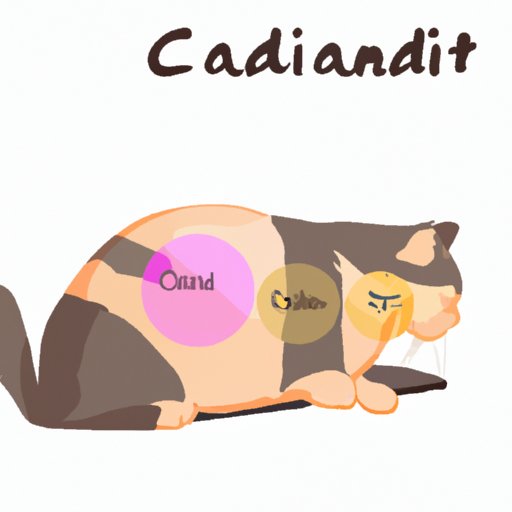
I. Introduction
If your feline friend is underweight or malnourished, you may be wondering how to help them gain weight and stay healthy. Just like humans, cats need proper nutrition to thrive. This article will provide tips and advice on how to help your cat gain weight, including specific high-calorie foods, supplements, and dietary changes to make.
II. 10 Foods to Help Your Underweight Cat Gain Weight
In order to gain weight, cats need to consume more calories than they burn. Here are 10 specific high-calorie foods that can help your cat gain weight:
- Fatty fish such as salmon or tuna
- Cooked eggs
- Chicken liver
- High-quality canned cat food
- Boiled chicken or turkey
- Pumpkin puree
- Low-sodium chicken broth
- Cottage cheese
- Plain Greek yogurt
- Beef or pork baby food (no onion or garlic)
Each of these foods works to add calories and nutrients to your cat’s diet in different ways. For example, fatty fish contains omega-3 fatty acids, which can help improve your cat’s coat, skin, and overall health. Cooked eggs are an excellent source of protein, while pumpkin puree is high in fiber to aid digestion. To incorporate these foods into your cat’s diet, start by introducing small amounts and gradually increasing over time to avoid digestive upset.
III. The Best High-Calorie Cat Supplements for Weight Gain
In addition to adding high-calorie foods to your cat’s diet, supplements can also aid in weight gain. Here are some of the best supplements to consider:
- Probiotics: These can help improve your cat’s digestive function and nutrient absorption.
- Omega-3 fatty acids: These can help improve your cat’s coat, skin, and overall health.
- L-lysine: This amino acid can help boost your cat’s immune system and appetite.
- Malt paste: This high-calorie paste can encourage your cat to eat more and gain weight.
- Appetite stimulants: These can help increase your cat’s interest in food.
It’s important to consult with your veterinarian before adding supplements to your cat’s diet. They can recommend the ideal dosages and help you choose the best supplements for your cat’s specific needs.
IV. 5 Simple Changes to Your Cat’s Diet to Improve Weight Gain
In addition to adding specific foods and supplements, making small dietary changes can also help improve your cat’s weight gain. Here are five changes to consider:
- Free-feeding: This means leaving food out all day so your cat can eat whenever they want.
- Adding wet food: Wet food is typically higher in calories than dry food, and the moisture content can help keep your cat hydrated.
- Adjusting meal portions: Try feeding smaller, more frequent meals throughout the day, rather than one or two large meals.
- Adding treats: High-calorie treats can serve as a supplement to your cat’s regular diet.
- Switching to a higher-quality food: Look for cat food that is high in protein and low in carbohydrates.
It’s important to make these changes gradually to avoid upsetting your cat’s digestive system, and to monitor their weight gain to ensure it stays healthy and steady.
V. Effective Tips to Help a Malnourished Cat Gain Weight
If your cat is severely malnourished, there are specific tips to help them regain weight. These include:
- Syringe feeding: This involves feeding your cat a high-calorie liquid diet through a syringe or feeding tube.
- Offering frequent meals throughout the day: Smaller, more frequent meals can help your cat gradually regain weight.
- Adding nutritional supplements: Supplements such as kitten formula or high-calorie gel can provide additional nutrients and calories.
- Proper hydration: Ensure your cat is well-hydrated by offering plenty of water or wet food.
- Veterinary consultation: It’s important to work closely with your veterinarian when dealing with severe malnutrition to ensure the best possible outcomes for your cat.
VI. How to Manage a Healthy Weight Gain for Your Cat with Exercise and Diet
While diet changes can help your cat gain weight, exercise can also play a role. Here are some exercises you can incorporate into your cat’s routine:
- Interactive toys: Toys such as feather wands or laser pointers can encourage play and exercise.
- Climbing structures: Cat trees or climbing structures can provide exercise and entertainment for your cat.
- Encouraging movement: Try tossing toys or treats to encourage your cat to move around.
It’s important to continue feeding your cat a high-calorie diet to support exercise and ensure healthy weight gain.
VII. Conclusion
Gaining weight and maintaining a healthy weight is important for your cat’s overall health and well-being. By incorporating specific high-calorie foods, supplements, and dietary changes, you can help your underweight or malnourished cat regain weight and thrive. Remember to consult with your veterinarian throughout the process to ensure your cat receives the best possible care and treatment.





